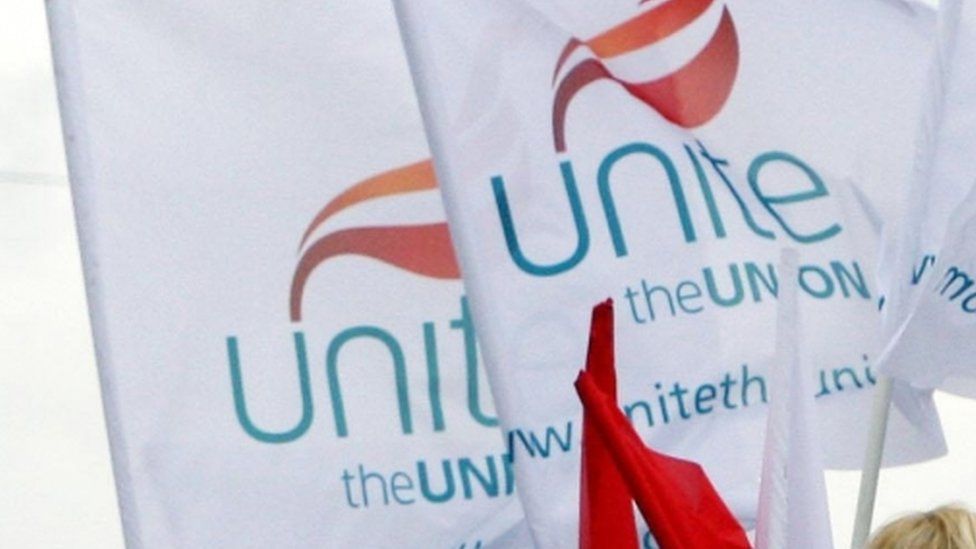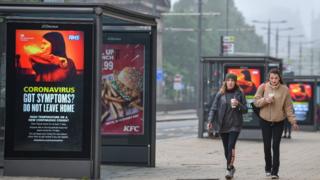
By Iain Watson
Political correspondent, BBC News
The race to succeed Len McCluskey as leader of the Unite union is hotting up, with four candidates setting out their pitch for the future of the union.
Why does it matter who wins?
The union under Len McCluskey’s leadership has been influential, and controversial, in its relationship with the Labour Party.
The leadership was supportive of Jeremy Corbyn – and has become increasingly critical of Keir Starmer.
But who leads the union is also important to its 1.4 million members and to employers who negotiate with it.
This contest could determine whether the union becomes more co-operative, or more confrontational.
Its reach extends from global to local: from big private sector employers in the aviation, car, chemicals and defence industries to local councils.
So who are the candidates and how do they differ?
While some of the policies put forward by the candidates are similar, each has a distinct approach.
Steve Turner is seen by many as a frontrunner, though no shoo-in.
He says he prefers a “seat at the table” to negotiation “by megaphone” and that he is “collegiate” .
He makes much of his willingness to talk to Conservative ministers on behalf of members, as he is doing currently on the beleaguered steel industry.
He told the BBC: “I am a pragmatist, I am a million miles from Tory ministers but I will sit down with them to cut a deal for my members.”
He says he would discuss, across the political spectrum, ideas on how the country copes with the Covid pandemic and what comes next.
He played a key role in devising the furlough scheme, and he has a message of hope when it comes to the changing nature of work – he wants to examine how increasing automation could be used to reduce the working week.
He would not fight shy of strike action where necessary, but his message is one of engagement.
A former bus worker, he is also currently one of Unite’s assistant general secretaries, having moved up the hierarchy as a regional and national organiser over nearly three decades.
He narrowly beat Mr Beckett in winning the endorsement of the United Left faction last year – a result Mr Beckett went on to dispute.
Howard Beckett is a solicitor by profession, and has been the union’s assistant general secretary for politics and legal since 2015.
A strong backer of former leader Jeremy Corbyn, he has been openly critical of Sir Keir Starmer’s leadership of Labour.
He is advocating an increase in the union’s strike fund from £40m to £50m and says: “I would definitely be advocating industrial action at this moment in time.
“I was hoping the narrative would change coming out of Covid but it hasn’t materialised.
“Health and council workers are being offered cuts in wages in real terms. We are having a government refusing to legislate to stop fire and rehire.
“Unite will be militant and take industrial action to demand change in society.”
His manifesto also has a proposal for a seven day a week Unite TV channel, arguing that ‘members deserve to know what’s happening in their communities “without it having to be filtered through the lens of mainstream media”.
Gerard Coyne is a former regional organiser in the West Midlands – he narrowly lost to Mr McCluskey during the bitter 2017 leadership contest.
He would regard himself as a “centre-left” contender, and has generally been supportive of Sir Keir’s leadership.
His key message is that the union should focus more on helping its members rather trying to be a “backseat driver of the Labour Party”, and has called for an independent probe into the use of members’ money to build a conference centre in Birmingham.
He believes the Unite union should be able to criticise itself, and change the way it is run.
He says: “During the pandemic, workplace representatives felt the union wasn’t there at a critical time when they needed it.”
He says he will improve members’ services, carry out a review of its internal democracy and grow the union beyond its traditional base.
Sharon Graham believes the union has spent too long ensnaring itself in the “internal wrangling” of the Labour Party.
She says its focus should be organising in the workplace and giving lay members more influence.
She tells the BBC: “Unashamedly I am talking about jobs pay and conditions as the number one, number two and number three priorities of the organisation.”
Her campaign may well be closely watched by employers.
She says she often gets involved in industrial disputes when they turn “hostile”, and puts some of her victories down to what is called ‘leverage’ – meaning applying pressure on multi-national companies to settle sometimes local problems.
For example, the union was recently in dispute with a bus company in Greater Manchester.
Union officials flew to Sweden where the same company was trying to negotiate a lucrative contract, and told authorities there about what they saw as its attacks on pay and conditions.
Ms Graham believes that the potential loss of the Swedish contract helped settle the dispute in the UK.
Currently running the union’s Organisation and Leverage unit, Ms Graham would be Unite’s first female leader if she wins the contest.
A former waitress, she has vowed to grow the Unite’s power base in sectors that have not traditionally been unionised, such as hospitality.
Why is the union important to Labour?
Unite is now the second largest in the UK, after Unison, but it is the largest affiliate to Labour, and by far its most generous trade union funder.
The union pays around £1.3m a year in affiliation fees, and also makes regular donations, contributing £3m to the party in the run up to the 2019 election.
He told the BBC: “If Labour continues down its path and no longer speaks for working people, and if Keir Starmer turns his back on the pledges he made…and the 2017 and 2019 manifesto commitments, he will not be getting Unite money if I am general secretary.”
In practice, he would make recommendations to the union’s executive council or to a policy conference to make the final decision. But he would strongly recommend that course of action.
And Ms Graham believes that the Westminster tail has too long been wagging the union dog.
She is biting back – and has accused Keir Starmer of “failing workers” during the pandemic.
She has told the BBC she favours “payment by results”.
While it would be the members who’d decide the future relationship with Labour, she believes there should be “no blank cheque” for the party.
If either Steve Turner or Gerard Coyne win, Labour’s money is likely to be in safer hands.
Although Mr Turner is on the Left, he told the BBC: “This is our party. Now is not the time to walk away but to put the gloves and get back in the ring – to guide and steer our party to make sure the leadership is listening to our members.”
Mr Coyne said “this ‘paying for policies approach’ is not something I believe is right”.
Unite delegates also get votes and can propose motions at Labour conference so can actually influence policy directly.
Mr Beckett has talked about putting forward a motion that would no longer requite the party leader to be an MP.
This would open up any future field to mayors such as Andy Burnham or Sadiq Khan.
Unite generously funded Jeremy Corbyn’s leadership bid, so could be influential when or if a contest were held.
Mr Turner says he backs a motion that would make the Parliamentary Labour Party accountable to the annual conference.
That may sound rather technical or obscure – but in practice, it would be a means of restoring the Labour whip to Jeremy Corbyn in Parliament.
What are the implications for Keir Starmer?
If Steve Turner or Gerard Coyne win, there would be no calls for Keir Starmer to quit.
But Howard Beckett will call on Sir Keir to go if the forthcoming by-election in Batley and Spen is lost.
This is likely to encourage others on the Left to follow suit.
He has denounced Sir Keir’s leadership during the pandemic as “deplorable” – and under his leadership, Unite could become an alternative power base in the Labour movement.
The union has seats on Labour’s ruling body, the NEC. Unite delegates also get votes and can propose motions at Labour conference so can actually influence policy directly.
What happens next?
To secure their place on the ballot, candidates must be nominated by 9 June.
Unite’s 1.4 million members will then have between 5 July and 23 August to complete and return their votes by post.
The result of the election will be announced on 26 August.
Is the process straightforward?
Last time round, to get on the ballot paper, candidates needed to be nominated by 50 branches, but that threshold has now been raised to 5% of all branches – that’s 174.
Gerard Coyne claims that “this favours the in house candidates – all three [of his] opponents are employees of the union”.
He says “this feels deliberate” – the union say the changes were democratically decided.
However if – as he believes – Mr Coyne doesn’t fall at this first hurdle and gets on the ballot, then he hopes to be a strong contender.
As the election is decided on a first-past-the-post basis, he hopes to benefit from a three-way split in the Left vote.
Two of the Left candidates – Howard Beckett and Steve Turner – say if this happens, they will need to have discussions about whether one or other should stand aside.
Sharon Graham told the BBC she would not be standing down.
Although on the Left, she says she is drawing support from across the political spectrum.
But if all four decide to stay in the race, it would be difficult to predict the result with any certainty.
This is likely to cause anxious moments in the Labour leader’s office.
But it is not just Gerard Coyne who is crying foul.
Howard Beckett sees his suspension from the Labour Party as an attempt by the party leadership to interfere in the Unite election.
Meanwhile, Mr Coyne has expressed surprise that Mr Beckett’s comments about Priti Patel hasn’t led to his suspension from the union.
It is going to be a long hot summer…
Source link

